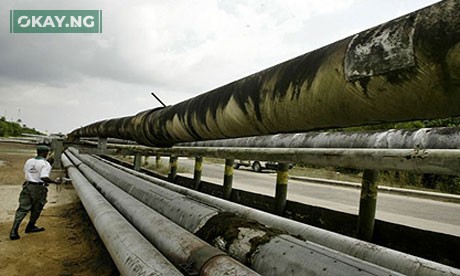A significant disruption has occurred in Nigeria’s oil sector as the Trans Niger Pipeline (TNP), a crucial artery for crude oil transport, has been shut down following a blast and subsequent fire, according to police reports released on Tuesday. The pipeline, which ferries crude from onshore oilfields to the Bonny export terminal, is a vital component of Nigeria’s oil infrastructure.
The Renaissance Group, a Nigerian oil consortium that recently acquired Shell’s onshore subsidiary operating the pipeline, confirmed the incident, stating, “We are responding to reports of an incident in our operations, including a regulator-led joint investigation visit.” The blast occurred in Rivers State, and the consortium has dispatched a team to investigate the cause and extent of the damage.
The TNP, with a substantial capacity of approximately 450,000 barrels per day, is one of two key conduits responsible for exporting Bonny Light crude, a significant grade of oil from Africa’s largest oil producer. Rivers State police have indicated that the situation is now under control, and investigations are underway to ascertain the cause of the blast, which occurred on Monday night.
“In connection with this, two individuals have been taken in for questioning as part of efforts to uncover any potential act of sabotage,” stated the police. This suggests that authorities are considering foul play as a potential cause of the incident.
The duration of the TNP shutdown remains uncertain, but a prolonged outage could have significant repercussions. Operators might be compelled to declare force majeure on Bonny Light exports, a legal clause that relieves parties from contractual obligations due to unforeseen circumstances. This would inevitably impact Nigeria’s oil revenue and potentially disrupt global oil supply chains.
The incident brings to the forefront the persistent challenges plaguing Nigeria’s oil sector. Pipeline sabotage and crude theft have been major factors driving international oil companies like Shell, Exxon Mobil, Total, and Eni to divest their onshore and shallow-water assets in favour of deep-water operations, which are considered less vulnerable to such disruptions.
Read Also: Renaissance Africa Completes Landmark $2.4B Shell Nigeria Acquisition
The recent acquisition of Shell’s onshore subsidiary by the Renaissance Group, which includes Nigerian exploration and production companies such as Aradel Energy, First E & P, Waltersmith, and ND Western, alongside the international energy group Petroline, marks a significant shift in the ownership landscape of Nigeria’s oil industry. This incident serves as an early test for the new operators, highlighting the complexities and risks associated with managing such critical infrastructure.
From an economic perspective, the shutdown of the TNP is a cause for concern. As an oil-dependent nation, disruptions to oil exports can have a cascading effect on Nigeria’s revenue, potentially impacting government budgets and economic stability. Furthermore, the incident underscores the human element in economic analysis. The reliance on oil revenue has created a complex web of socio-economic issues, including environmental degradation, community unrest, and the very sabotage and theft that led to this current crisis.
As a news writer with five years of experience covering the energy sector, I understand the delicate balance between reporting facts and conveying the potential human impact of such events. While maintaining objectivity, it’s crucial to acknowledge the emotional and economic anxieties that incidents like this can trigger. The hope is that the investigation will be swift and transparent and that measures will be taken to prevent future occurrences, ensuring the stability of Nigeria’s vital oil infrastructure. The situation demands a comprehensive approach, not only to secure the pipelines but also to address the underlying socio-economic issues that contribute to these disruptions.













